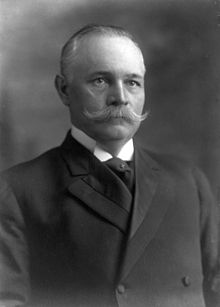Duncan U. Fletcher
Duncan Upshaw Fletcher | |
|---|---|
 Fletcher in 1910 | |
| United States Senator from Florida | |
| In office March 4, 1909 – June 17, 1936 | |
| Preceded by | William Hall Milton |
| Succeeded by | William Luther Hill |
| 21st & 25th Mayor of Jacksonville | |
| In office 1893–1895 | |
| Preceded by | Henry Robinson |
| Succeeded by | William M. Bostwick |
| In office 1901–1903 | |
| Preceded by | J. E. T. Bowden |
| Succeeded by | George M. Nolan |
| Personal details | |
| Born | January 6, 1859 Americus, Georgia, U.S. |
| Died | June 17, 1936 (aged 77) Washington, D.C., U.S. |
| Political party | Democratic |
| Spouse | Anna Louis Paine |
| Alma mater | Vanderbilt University |
| Profession | Lawyer |
Duncan Upshaw Fletcher (January 6, 1859 – June 17, 1936) was an American lawyer and politician of the
Early life and career
Born near
Political career
Fletcher became active in municipal politics and was elected to the city council in 1887 and served as Mayor of Jacksonville from 1893 to 1895 and from 1901 to 1903. He rebuilt Jacksonville after the devastating Great Fire of 1901. In 1893, he was elected to the Florida House of Representatives. From 1900 to 1907, Fletcher chaired the Board of Public Instruction of Duval County. In 1908, he served as president of the Gulf Coast Inland Waterways Association and later, the Mississippi to Atlantic Waterway Association.
Senate career
In 1909, the Florida Legislature elected Fletcher, a Democrat, to the United States Senate, where he served and was re-elected for four consecutive terms. In 1913, President
Fletcher died of a heart attack in Washington, D.C., and was interred in the Evergreen Cemetery in Jacksonville.
Senator Fletcher was a trustee of
Views
Fletcher was a staunch supporter of the Confederate cause. In 1931 he delivered a speech to the United Daughters of the Confederacy: "The South fought to preserve race integrity. Did we lose that? We fought to maintain free white dominion. Did we lose that? The States are in control of the people. Local self-government, democratic government, obtains.[1] That was not lost. The rights of the sovereign States, under the Constitution, are recognized. We did not lose that. I submit that what is called “the Lost Cause” was not so much “lost” as is sometimes supposed."[2]
Honors
- Duncan U. Fletcher High School in Neptune Beach, Florida
- Duncan U. Fletcher Middle School in Jacksonville Beach
- Phi Alpha Delta Fletcher Chapter at UF Law
- Duncan U. Fletcher Hall at the University of Florida
- During World War II the Liberty ship SS Duncan U. Fletcher was built in Panama City, Florida, and named in his honor.[3]
- Fletcher Ave. in Tampa, Florida
United States Senate Elections
- Duncan U. Fletcher (D) was nominated for the United States Senate in a primary election on June 16, 1908, and elected by the legislature in its next convening.
- Duncan U. Fletcher (D) (inc.) – (99.5%)
- Duncan U. Fletcher (D) (inc.) – (69.5%)
- John M. Cheney(R) – (26.0%)
- M.J. Martin (Soc.) – (2.5%)
- G. A. Klock (R-White) – (2.0%)
- Duncan U. Fletcher (D) (inc.) – (77.9%)
- John M. Lindsay (I) – (12.8%)
- Duncan U. Fletcher (D) (inc.) – (99.8%)
See also
- List of United States Congress members who died in office (1900–49)
Notes
- ^ Used in the old meaning "exists".
- ^ Ta-Nehisi Coates, “What this Cruel War Was Over,” The Atlantic, June 22, 2015, www.theatlantic.com/politics/archive/2015/06/what-this-cruel-war-was-over/396482/, accessed January 1, 2020
- ISBN 978-1476617541. Retrieved December 7, 2017.
- ^ DIRECT ELECTIONS TO THE UNITED STATES SENATE 1914–98
External links
United States Congress. "FLETCHER, Duncan Upshaw (id: F000200)". Biographical Directory of the United States Congress.


